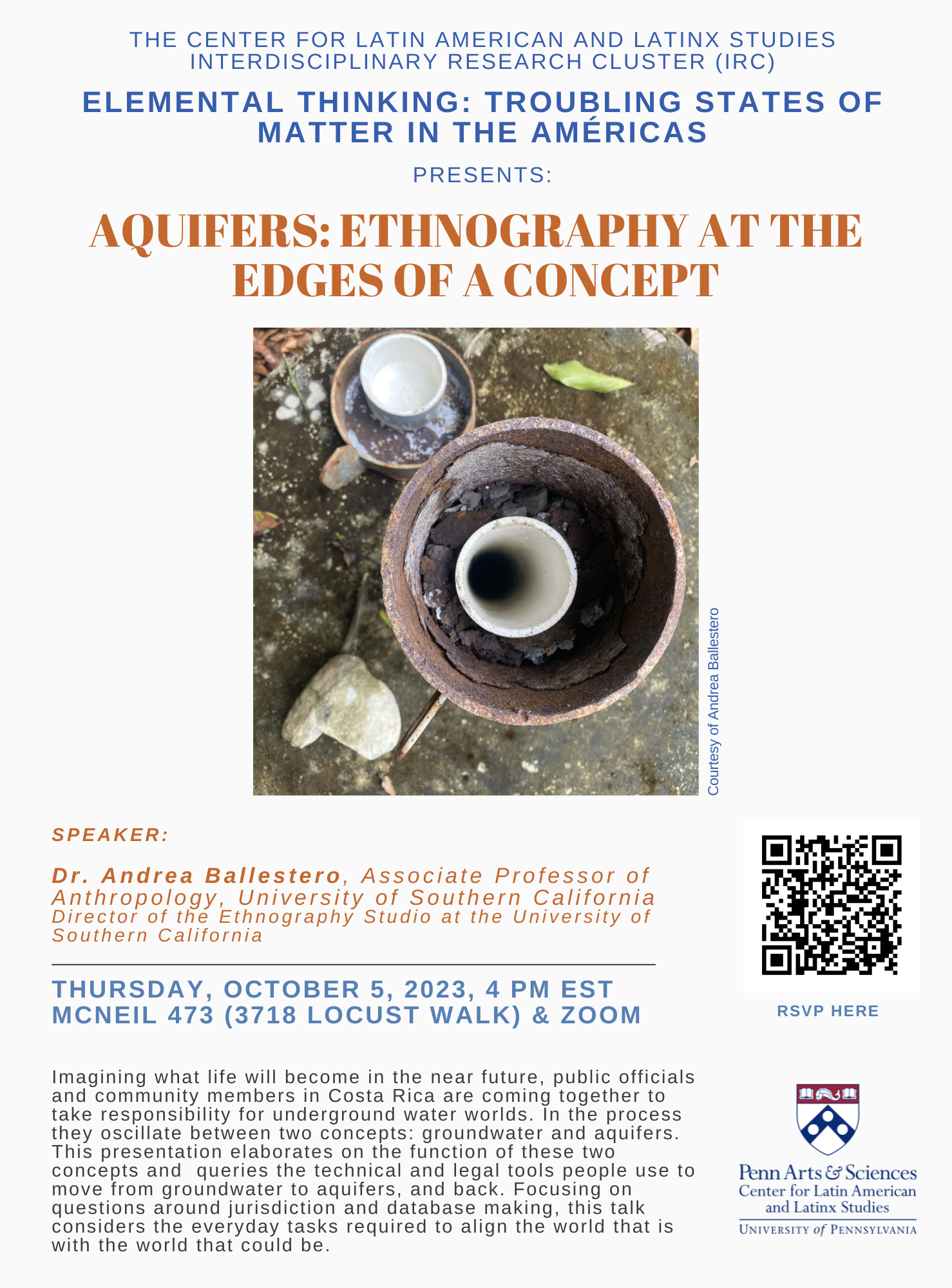McNeil 473 (3718 Locust Walk) and Zoom

Andrea Ballestero (Associate Professor of Anthropology, USC Dornsife) will present "Aquifers: Ehtnography at the edges of a concept," in this second installment of the "Elemental Thinking: Troubling States of Matter in the Americas" lecture series sponsored by the CLALS Interdisciplinary Research Cluster (IRC). This IRC is led by Penn professors Kristina Lyons (Anthropology) and Jon Hawkings (Environmental Sciences) in collaboration with other professors and graduate students across Penn’s schools and partners from Latin America and the U.S.
RSVP HERE to attend in person.
RSVP HERE to attend by Zoom.
About this talk:
Imagining what life will become in the near future, public officials and community members in Costa Rica are coming together to take responsibility for underground water worlds. In the process they oscillate between two concepts: groundwater and aquifers. Groundwater efficiently conveys a sense of water as a fungible unit that can be exchanged, banked, or spent. In contrast, the figure of the aquifer activates a grounded concept whereby land, liquidity, and history are inseparable. This paper queries the technical and legal tools people use to move from groundwater to aquifers, and back. Focusing on questions around jurisdiction and database making, I consider the everyday tasks required to align the world that is with the world that could be.
About the presenter:
Dr. Andrea Ballestero is Associate Professor of Anthropology and Director of the Ethnography Studio at the University of Southern California. Her book A Future History of Water (Duke 2019) examines how people engage with the world as it is, but differently and do so by creating endless bifurcations. In Costa Rica, the latter are means to create a difference between water as a human right and water as a commodity as material and political projects. She is co-editor of Experimenting with Ethnography: A Companion to Analysis (2021), a collection of essays and protocols to inspire creative analytic ethnographic work. Currently, Dr. Ballestero is writing a book that explores cultural imaginaries of the underground as a new planetary frontier. In recent publications she has explored aquifers as a financial frontier, practices of touching with light through GIS technologies, physical models as hydro-geo-social choreographies of responsibility, and has developed the concept of casual planetarities. Her scholarship is located at the intersection of feminist STS, legal anthropology, and social studies of finance and has been supported by the National Science Foundation, the Mellon Foundation, the Wenner Gren Foundation, the Social Science Research Council, and the Fulbright program.
About this IRC:
The elements have been taken up as a heuristic in the Arts and Sciences to understand environmental systems and change across geographical and cultural contexts. The approach to studying environments through the elements – most notably the classical elements of fire, earth, water, and air – has been foundational to the composition of Environmental Anthropology and its configurations of expertise, as well as the Environmental Sciences. However, the stakes of our current socio-ecological crises demand we engage with the elements as more than only taxonomies, statistics, and natural resources. This proposed interdisciplinary research cluster focuses specifically on socio-environmental conflicts and justice struggles involving these elemental assemblages. Our IRC cluster will engage with these pressing issues by placing the social studies of science & technology (STS), environmental law/justice, and the natural and environmental sciences in conversation through the combination of several activities: talks with invited guests and the organization of workshops and roundtables. We will focus on both case studies and broad trends occurring across the hemisphere in academic scholarship, scientific knowledge production, and public praxis. (Written by Kristina Lyons)

 Center for Latin American and Latinx Studies
Center for Latin American and Latinx Studies